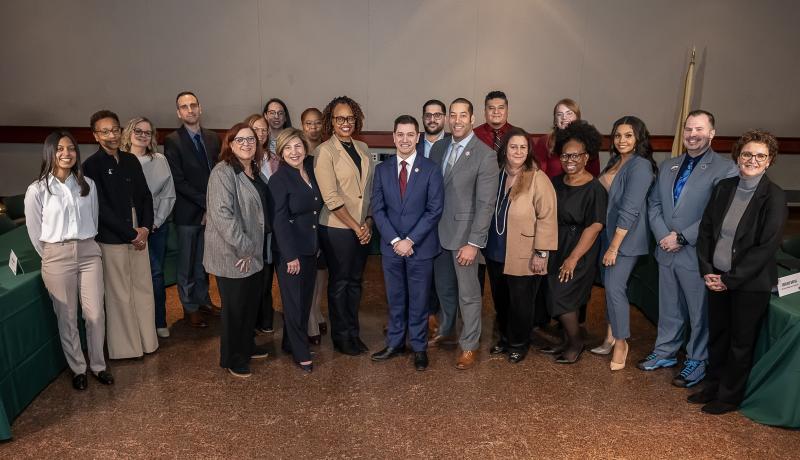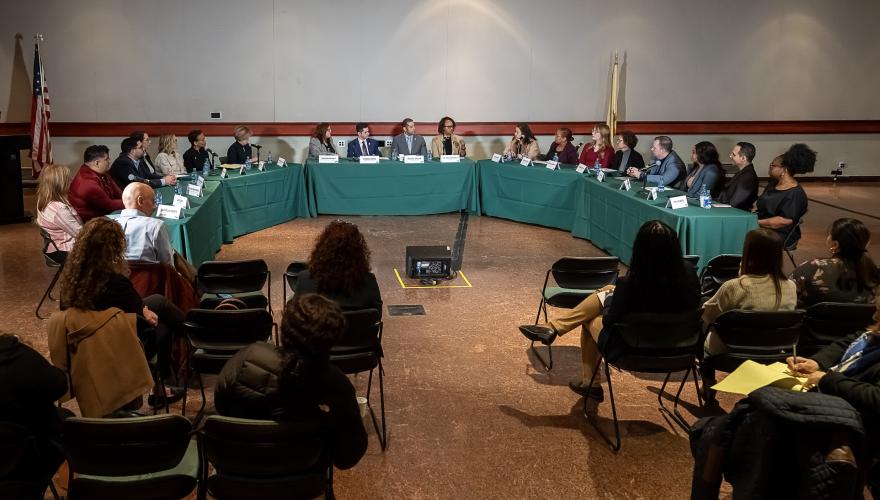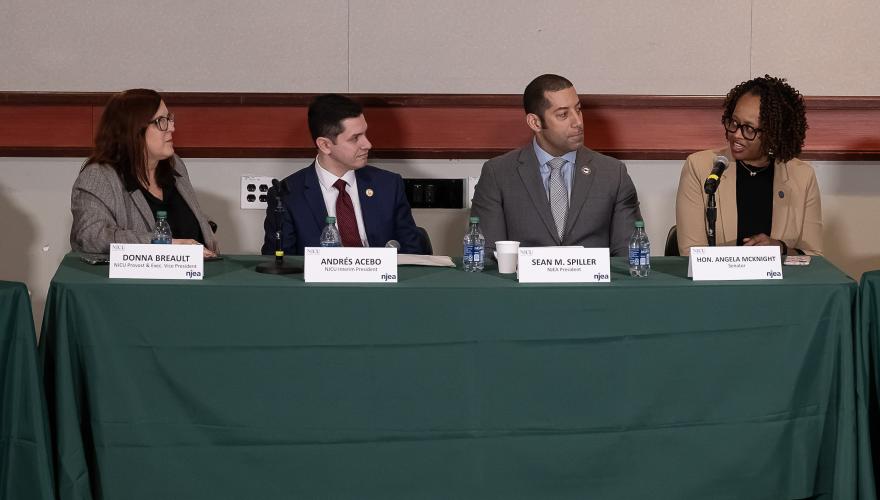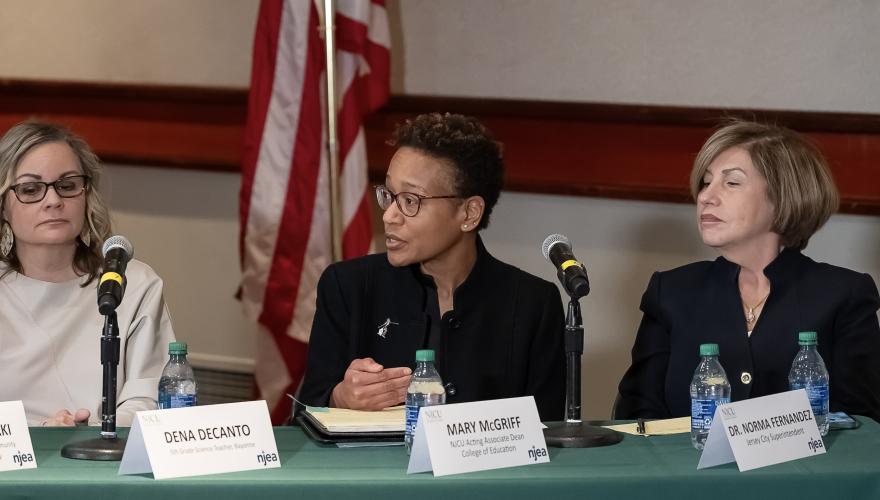New Jersey City University and the NJEA Hosted Educational Roundtable to Address New Jersey’s Teacher Shortages

JERSEY CITY, N.J. | New Jersey City University (NJCU) and its Deborah Cannon Partridge Wolfe College of Education partnered with the New Jersey Education Association (NJEA) to co-host an educational roundtable discussion on Monday, March 11 in an event held on campus at the Gilligan Student Union Building.
This initiative, entitled “Teachers Rise Up: Propelling our Profession Forward”, aimed to address critical staff shortages in New Jersey’s public schools and discussed solutions for recruitment and retention of educators.
The event was led by NJEA President Sean Spiller and NJCU Interim President Andrés Acebo, and included New Jersey State Senator Angela V. McKnight (District 31), Jersey City Public Schools Superintendent Norma Fernandez, and Union City Superintendent Silvia Abbato. The roundtable consisted of current NJCU teacher candidates studying in the College of Education, NJCU alumni who are currently educators in various partnering school districts, Interim Provost and Executive Vice President of Academic Affairs Dr. Donna Breault, College of Education Dean Lourdes M. Sutton, Ed.D., and members of NJCU’s faculty in the College of Education.
Event Photo Gallery (📸credit: Paul Gargiulo/NJCU University Communications)
During President Acebo’s opening remarks, he announced potential opportunities for the university and NJEA to continue partnering to further higher educational opportunities for New Jersey’s teachers.
The discussion acknowledged the persistent problems of recruitment and retention of teachers for New Jersey’s classrooms, and highlighted the role of Educator Preparation Programs (EPPs) in addressing these issues.

"At New Jersey City University, we are proud to partner with the NJEA to address the statewide teacher shortage by focusing on innovative and impactful programs with proven outcomes — of placing motivated, qualified teachers in New Jersey's classrooms," said President Acebo. "We are moving the needle through our commitment to our Teacher Intern Program (TIP), which creates paid internships for those seeking teacher certification and hence provides experience in classrooms and additional support for students in the Hudson County community while providing a financial lifeline to many of our students. Additionally, NJCU's Center for Teacher Preparation and Partnerships continues to offer diverse and equitable urban internship opportunities for teacher candidates within our partner school districts. Preparing future educators to meet today’s and tomorrow’s challenges is at the core of NJCU's mission for nearly 100 years, and working together with the NJEA, will be a focal point in driving New Jersey forward by elevating the promise of every child in every community as we mold a noble profession to finally break down historical systemic barriers to the equalizing promise of a thorough and efficient education."
NJCU, with its focus on supporting students from economically challenged backgrounds, emphasized the importance of providing essential support for student success — an area where the university has been especially innovative.
Current teacher candidates and educators shared their experiences and highlighted the effectiveness of NJCU's programs in preparing them for success. Notably, the Teacher Internship Program (TIP) was identified as being especially impactful in providing early opportunities for students to gain access to the classroom experience as teacher interns, consistent mentorship, early career support, and ongoing professional development.
Dr. Donna Breault said: “Monday’s round table event with the NJEA highlighted our shared aims of preparing high quality teachers for New Jersey. Our teacher interns’ stories demonstrate what can happen when you remove financial barriers to educational and career goals. NJCU’s Teacher Intern Program is a unique initiative that meets our students where they are and provides valuable classroom experience and leadership opportunities. The stakeholders around the table — NJEA leadership, area superintendents, alumni, faculty, and students — recognized and celebrated the impact of this incredible program.”
Lourdes M. Sutton, Ed.D., Acting Dean of the Deborah Cannon Partridge Wolfe College of Education, added: “Collaboration is vital for successful teacher recruitment, retention, and achievement in New Jersey's public schools, and that makes this week’s event so very important. What we heard from our NJCU teacher candidates makes us proud of our efforts, and proves that our dedication to providing innovative programming like TIP is making a difference in teacher preparation, and will help ensure that our state’s K-12 students receive the quality education that they deserve.”

About NJCU’s Teacher Internship Program
Established in 2015, the NJCU Teacher Intern Program (TIP) provides paid experience for pre-service teachers in the College of Education. Students pursuing a degree in education are placed in area partner schools to work alongside experienced teachers as early as their freshman year. Since 2016, the program has moved to eight partner schools in the Hudson County, N.J. area, providing paid learning/working experiences for close to 80 interns. These students create work schedules around their academic calendars and can work anywhere from 10-40 hours per week. Additionally, the College of Education offers major courses outside of partner school hours, allowing ample time for interns to work and fulfill their in-class academic requirements.
The program continues to evolve. Beginning Fall 2023, university students wishing to complete a Bachelor of Arts in Elementary Education will have the TIP program embedded in their teacher preparation program. Their working hours will be woven into their academic schedules, allowing enough time to focus on and balance the experiential and academic segments of their teacher preparation program. Diversifying the teacher pipeline, through TIP, is critical as we highlight the racial and ethnic breakdown of each of our partner schools.
The Teacher Intern Program implements a “Teacher Leader” role at the undergraduate level. Interns in the program that exhibit effective leadership skills and interpersonal attributes act as Lead Interns. Each of the partner schools has at least one Lead Intern, whose responsibilities encompass a range of tasks crucial to the success of the overall program. Lead Interns act as a liaison between the university program director and partner school contact, coordinating work schedules, interfacing with cooperating teachers, facilitating Human Resources onboarding of interns, assisting with securing of substitute licenses, and troubleshooting when necessary. As future teachers, Lead Interns develop leadership skills that may not necessarily be found without this position.
The professional development piece is paramount in that it creates the foundation for TIP. All interns attend monthly meetings as a group each academic year. There they take part in workshops focused on theory, research, and related classroom applications. The professional development meetings are also offered as a three-credit course that counts toward graduation. Topics covered in these meetings include classroom management, teacher identity, culturally responsive teaching, and infusing technology in classrooms. More recently, NJCU has added a Praxis Core preparation strand to monthly professional development meetings so that interns who need additional support in passing these state-required examinations can receive it.
TIP continues to be a valuable component of the university’s teacher preparation program. The school-to-job pipeline is strong and the interns are positioned to enter their own classrooms equipped with a wealth of knowledge and experience about real classrooms before their first official year of teaching. Hiring districts value the candidates who have authentic experiences prior to their career starts. Imperative to the experiences is the theoretical foundation from which they built their instructional pedagogy through the professional development initiative the program offers.

About NJCU:
New Jersey City University is a comprehensive public regional institution of higher learning located in Jersey City, N.J., dedicated to the development of our students, our city, our communities, and our state. We are a game-changing force for our students and have been recognized as one of the top colleges in the nation improving their upward economic mobility. In fact, NJCU has been ranked No. 1 in New Jersey and Top 10 in the nation in the CollegeNET Social Mobility Index for 2023. Whether enrolled in one of our undergraduate, graduate, or doctoral programs at our three locations, NJCU students have access to an affordable, diverse environment, and an exceptionally supportive faculty. This prepares them to go on to become the next generation of workers and leaders who improve their communities and the State of New Jersey.
Contact:
Ira Thor, Associate Vice President for University Communications | ithor@njcu.edu | 201-200-3301